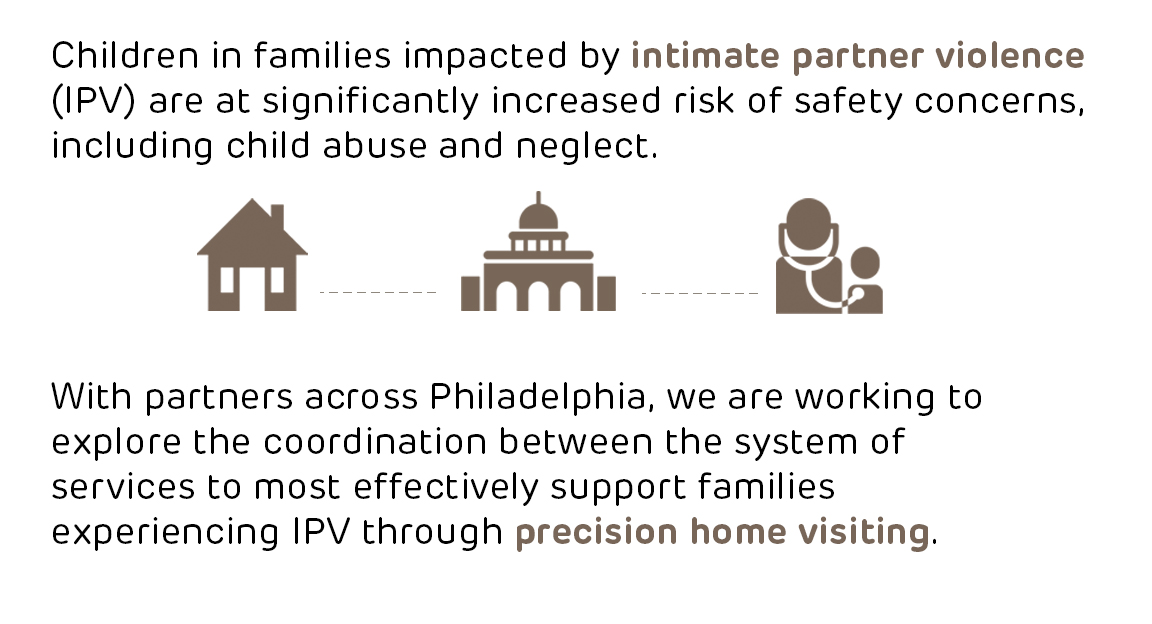Improving Outcomes for Families Experiencing Intimate Partner Violence Through Precision Home Visiting
Statement of Problem
More and more, policymakers are turning to early childhood home visiting as the singular strategy to effectively serve young families in high-risk communities. However, families engaged in home visiting often face complex social issues and require clinical, therapeutic and other social services beyond the typical scope of evidence-based home visiting programming.
The need to more concretely define what successful service coordination looks like between home visiting programs and other service providers, as well as measure the impact of that coordination on family outcomes, is a national home visiting research priority and one well-aligned with the concept of precision home visiting. This concept focuses on what program components work best for groups of families in particular contexts. A precision home visiting approach goes beyond traditionally used subgroup characteristics—such as race, gender, and economic status—to include strengths, needs and past experiences.
In Pennsylvania, and acutely within Philadelphia, a critically important subgroup of home-visited families is those experiencing intimate partner violence (IPV). Children in families impacted by IPV are at significantly increased risk of safety concerns, including child abuse and neglect. From a home visiting perspective, IPV negatively impacts client engagement in the program and the outcomes that the program can achieve. As the evaluators of the federal Maternal, Infant, and Early Childhood Home Visiting Program (MIECHV) expansion in Pennsylvania, we heard firsthand about the unique issues facing families, and how IPV is detrimental to their engagement in the program.
At this time, it is unclear how coordinated the system of services are within our community to most effectively support home-visited families experiencing IPV.
Description
Improving Outcomes for Families Experiencing Intimate Partner Violence Through Precision Home Visiting
Improving Outcomes for Families Experiencing Intimate Partner Violence Through Precision Home Visiting


These research findings will be used help develop an intervention to more clearly define, integrate and strengthen the role of home visiting agencies within the greater network of local supports for families experiencing IPV.
To explore these unknowns, we are conducting a project in collaboration with city leadership at the Office of Domestic Violence Strategies, IPV service agencies (Lutheran Settlement House and Courdea [formerly Menergy]), and local home visiting programs at Maternity Care Coalition, National Nurse Led Care Consortium and ParentChild+.
At the start of the project, we convened an interagency advisory group comprised of these partners, meeting monthly. Now in the third year, the advisory group has grown to include experts with lived experience. The relationships built and maintained, despite COVID-19 limitations, have been an integral part of meeting our project goals, which are to:
- Define and describe the current infrastructure of social and clinical services available to home-visited families in Philadelphia
- Qualitatively assess perceived barriers and facilitators to service connection and collaboration among home visiting organizations and community-based IPV agencies
- Develop and pilot an intervention that aims to enhance capacity and coordination strategies for home visiting and IPV agencies
To work towards these goals, we first used social network analysis to describe the existing service landscape for families with young children impacted by IPV and measure the connectedness that exists within this landscape. This method allowed us to understand where relationships already exist and identify opportunities for improving community connections. Survey findings from nearly 50 organizations in the Philadelphia area found great variability in the number, type and strength of existing interagency collaborations.
Additionally, qualitative findings from four focus groups with IPV and home visiting service providers gave an in-depth look at the priority issues they experience in supporting clients impacted by IPV. These sessions also produced prioritized lists of potential innovations to overcome these issues, including stronger or alternative methods of interagency collaboration.
These research findings, combined with input from our advisory group, will be used to inform our third goal: developing an intervention to more clearly define, integrate, and strengthen the role of home visiting agencies within the greater network of local supports for families experiencing IPV. Specifically, we are developing the components of an action-oriented, stakeholder-driven training and case consultation model with participation from home visitation services, Lutheran Settlement House and Courdea.
We envision a structure that leverages the skills and expertise of home visiting and IPV professionals, builds internal capacity within home visitation agencies and develops a foundation for future collaborative work. Moreover, we imagine this shared focus on improving the experience of families experiencing IPV will lead to practice and policy shifts within and across these organizations, resulting in better care for Philadelphians.
Next Steps
We are working with our advisory group to further define components of our pilot intervention, resource needs, and evaluation metrics, with the goal of launching the pilot in Spring 2023. We are also focusing the final project year on a dissemination plan to share our findings widely. This will include a range of academic and policy publications directed at social service, early childhood, policy and research audiences. We are excited for the opportunity to apply our learnings on what is needed to strengthen the network of available supports and improve client outcomes for families with young children experiencing IPV.
This project page was last updated in December 2022.
Suggested Citation
Children's Hospital of Philadelphia, PolicyLab. Improving Outcomes for Families Experiencing Intimate Partner Violence Through Precision Home Visiting [Online]. Available at: http://www.policylab.chop.edu. [Accessed: plug in date accessed here].